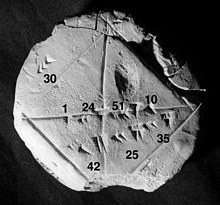
Back رياضيات محوسبة Arabic Вылічальная матэматыка Byelorussian Вылічальная матэматыка BE-X-OLD Aritmètica computacional Catalan Шутлавла математика CV Computermathematik German Υπολογιστικά μαθηματικά Greek Matemática computacional Spanish ریاضیات محاسباتی Persian Mathématiques computationnelles French
| Part of a series on | ||
| Mathematics | ||
|---|---|---|
|
|
||
|
| ||

Computational mathematics is the study of the interaction between mathematics and calculations done by a computer.[1]
A large part of computational mathematics consists roughly of using mathematics for allowing and improving computer computation in areas of science and engineering where mathematics are useful. This involves in particular algorithm design, computational complexity, numerical methods and computer algebra.
Computational mathematics refers also to the use of computers for mathematics itself. This includes mathematical experimentation for establishing conjectures (particularly in number theory), the use of computers for proving theorems (for example the four color theorem), and the design and use of proof assistants.
- ^ National Science Foundation, Division of Mathematical Science, Program description PD 06-888 Computational Mathematics, 2006. Retrieved April 2007.
© MMXXIII Rich X Search. We shall prevail. All rights reserved. Rich X Search